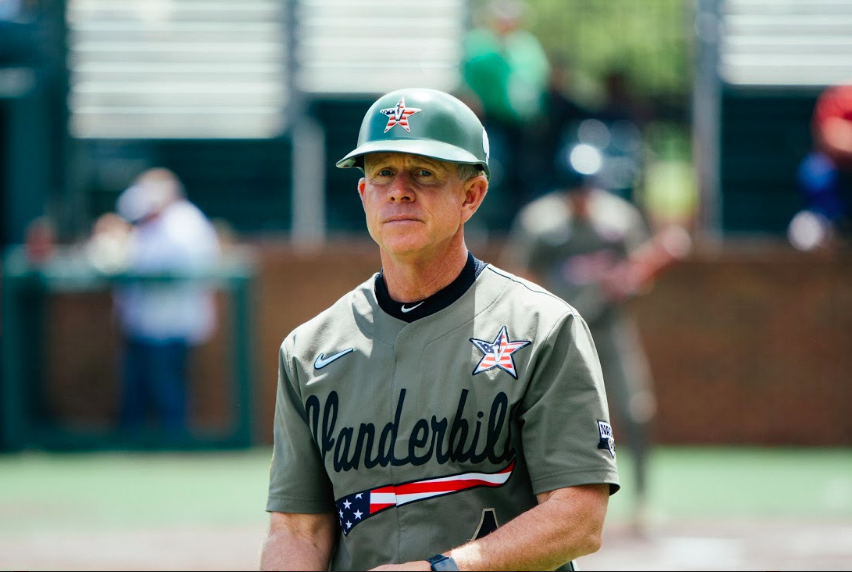SCHNEIDER: College World Series Final shows need for third paid assistant
This past April, NCAA’s Division I council voted against the proposal to pay third assistant coaches. That shouldn’t stand in this sport.
Tim Corbin sat at the microphone on Sunday morning and took a deep breath.
The Vanderbilt head baseball coach had finished posing in front of the National Championship trophy, and his players had just been excused from the press conference moments ago. It was the eve of the most important day in the past five years of his program, but it seemed to be the furthest thing from his mind.
When Corbin opened his mouth to speak, out came a long, impassioned monologue on the injustice within his sport.
“I’m 32 years old, I’m married, I have a child,” said Corbin of his early days in college baseball. “I leave the home at 7:30 every morning. I come back at eight o’clock, nine o’clock at night. I do it Sunday through Sunday. I don’t get paid. I don’t get compensated. My wife stays home with the baby. We can’t afford daycare, and God forbid he goes to daycare and gets sick, I don’t have benefits, so I can’t pay for that. Can’t get a ticket to a football game. Can’t get a ticket to a basketball game. Can’t eat with a recruit. Why? I’m a volunteer. I stay all year, I work. I got to go off in the summer and work camps. Why? I can’t recruit. I’m a volunteer. I make camp money, I come home, I put stress on my wife. I can’t have another child. It costs money to have children. I can’t do it. I’m a volunteer.”
“It’s the most short-sighted thinking aspect of our game that we’ve been a part of,” he continued. “We lose good people to other jobs, other sports, softball, professional baseball, or they leave baseball because they can’t afford to stay in it.”
Corbin, of course, is talking about the third assistant coach position, a position that has remained a volunteer one since its inception decades ago. In college baseball, there are four main coaching positions from an on-field standpoint – the head coach, two assistant coaches (usually one of whom is the pitching coach), and the volunteer assistant coach. That last position highlights a major problem in college baseball.
It’s a position both he and his counterpart, Michigan head coach Erik Bakich, know all too well. Both began their careers as unpaid assistant coaches. Now, they lead 2019’s two best baseball programs in the country.
If there’s any proof of the importance of third assistants in college baseball, it’s these two guys. Both worked their way up through the ranks thanks to that initial gig. Both of them rely heavily on their third assistants, Vanderbilt’s David Macias and Michigan’s Michael Brdar, on the recruiting trail. Michigan has players from 12 different states. Vanderbilt has players from 14 states and two countries. These are programs that pour their effort into traveling and recruiting.
Coaching college baseball is a full time job, yet these coaches do it for free because they have to. The NCAA doesn’t permit colleges and universities to pay a third baseball assistant, outvoting a proposal that would change that rule just this past April by a vote of 36-25-3.
In the words of Corbin, that’s “sinful.”
“Why that hasn’t been changed, why that hasn’t been turned over in the last couple years is really sinful,” he lamented. “It’s dehumanizing in so many different ways. It doesn’t open up opportunities.”
People use the words “common sense legislation” in the political sphere all the time, and that applies here as well. Never before have I seen a proposal so unanimously agreed upon by coaches and players involved in the sport get denied. Third assistants are providing a service to the baseball program – a vitally important one – and should be compensated for that service. If Corbin’s story doesn’t open eyes as to the effect that can have on one’s personal life, I’m not sure what will.
The unfortunate part of the situation is that while Bakich was asked the same question in Sunday’s press conference, he was forced to choose his words more carefully. Corbin coaches for a school, and within a conference, whose athletic directors proposed this rule change to the NCAA. They voted in lockstep, unanimously voting to pay the third assistant. Bakich coaches for a university that opposed the third paid assistant. Michigan athletic director Warde Manuel, like most of his Big Ten counterparts, voted down the proposal, and ended up on the winning side of it.
“I thought it was low-hanging fruit, an opportunity to really elevate our game,” said Bakich. “I was, just like all the coaches out there, disappointed it didn’t pass. I just think the growth of our sport should always be at the forefront by the people who care about it and that was one way to grow our sport.”
Bakich is right. This is a growing sport, one that continues to flourish with each year. The College World Series is proof of that. An average of 1.89 million people tuned in to watch each game of the College World Series Final between Florida and LSU in 2017. That number rose to 1.96 million just last year when Arkansas met Oregon State. In fact, game two of that series peaked at 3.1 million viewers, more than all but one Major League Baseball game to date that season. This year is poised to break those marks.
Football and basketball are still undoubtedly the cash cows of college athletics, but college baseball is making a name for itself, particularly with the success of a Northern program like Michigan.
It’s time for the sport to adapt to that growth and push some of the revenue toward those helping grow it.
Bakich and Corbin have both been those guys. Corbin has spent years driving around the country, sleeping in his car during recruiting trips because he couldn’t afford a hotel. Bakich worked alongside Corbin as an unpaid assistant at Clemson and cited that willingness and determination as one of the reasons he admired Corbin early in his career.
There’s a reason that stuck out, though. It’s because what Tim Corbin did went well above and beyond what should be expected of college coaches. That’s not a sustainable model of success for most coaches. It’s not a financially healthy one either.
“Recruiting and player development are two pillars of all programs and for those individuals to continue to grow as individuals and as coaches, they need those repetitions recruiting,” said Bakich. “They need to go out and see players, evaluate players, build relationships, expand their network and put themselves in the best position to get opportunities… but I think we all agree that having someone serve in a volunteer capacity and not get paid doesn’t seem right either.”
It doesn’t seem right. It creates a financial barrier to entry that should never exist in a hierarchical industry like college athletics. It forces coaches to make tremendous sacrifices, and to possibly put themselves in a financially unstable position just to take that next step. The money is there. Revenue money continues to grow. Changes have been made to stadiums to increase ticketing revenue. And the players are noticing it too.
Jake Mangum might be the biggest name in the sport. His career at Mississippi State will go down in college baseball lore. He is the all-time SEC hit leader, ranking fourth in Division-1 baseball in all-time hits. He helped lead the Bulldogs to Omaha in each of the past two years.
Simply put, he has been the face of college baseball. And what did Mangum say on his way out, in his last opportunity in front of a microphone before he exited screen for good?
“College baseball is evolving,” Mangum said. “It is. You know, for four years, I just want to let everyone know, it’s time for a third paid assistant coach in college baseball.”
“Every year we’ve had assistant coaches that have not been paid who spend hours upon hours upon hours doing all they can for our program, sleeping in the offices, scouting for us, dealing with camps,” he continued. “Come on, man. Go out there and watch that game. There’s 30,000 people in that stadium. A million people watching it. Come on. It’s time to change. It really is.”
Mangum is right. It’s time to change. The next vote on the rule will be in 2022.
That’s three more years of unpaid assistants.
Let’s not make it any more than that.
For Corbin and Bakich’s full answers about the third paid assistant, click here. It begins at 20:31.

Max Schneider (’20) was the Sports Editor for the Vanderbilt Hustler. He has been on staff since the first semester of his freshman year, first as a staff writer and shortly thereafter as the Deputy Sports Editor. Max also serves as the host of VU Sports Wired on Vanderbilt Television and The Hustler Sports 30 on VandyRadio.
He majored in communications studies and political science in the College of Arts and Science. Max has had bylines on NHL.com and has previously worked for The Nashville Predators,...

